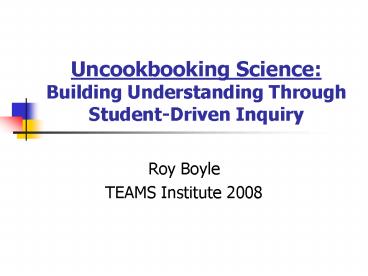Uncookbooking Science: Building Understanding Through StudentDriven Inquiry - PowerPoint PPT Presentation
1 / 17
Title:
Uncookbooking Science: Building Understanding Through StudentDriven Inquiry
Description:
(as described in Inquiry and the National Science Education Standards, 2000) ... 3. Learners DRAW CONCLUSIONS or FORMULATE EXPLANATIONS from the evidence. ... – PowerPoint PPT presentation
Number of Views:59
Avg rating:3.0/5.0
Title: Uncookbooking Science: Building Understanding Through StudentDriven Inquiry
1
Uncookbooking Science Building Understanding
Through Student-Driven Inquiry
- Roy Boyle
- TEAMS Institute 2008
2
THE ACTIVITIES
3
Traditional Science
- Purpose
- Procedure
- Data
- Analysis
- Conclusion
Follow the recipe and you get the correct answer.
4
Not that there is anything wrong with that, but..
5
Is this scientific inquiry?
?
?
Hmmm..
?
?
?
6
Scientific Inquiry Defined
- inquiry is an active learning process in which
students answer research questions through data
analysis. - Bell, R., Smetana, L., Binns, Ian (2005).
Simplifying inquiry instruction. Assessing the
inquiry level of classroom activities. The
Science Teacher.
7
Messing With the Recipe
8
Essential Elements of Inquiry(as described in
Inquiry and the National Science Education
Standards, 2000)
- Learners engage in scientifically oriented
QUESTIONS.
9
Essential Elements of Inquiry(as described in
Inquiry and the National Science Education
Standards, 2000)
- 2. Learners give priority to EVIDENCE in
responding to questions.
10
Essential Elements of Inquiry(as described in
Inquiry and the National Science Education
Standards, 2000)
- 3. Learners DRAW CONCLUSIONS or FORMULATE
EXPLANATIONS from the evidence.
11
Essential Elements of Inquiry(as described in
Inquiry and the National Science Education
Standards, 2000)
- 4. Learners CONNECT and EVALUATE explanations
with scientific knowledge.
12
Essential Elements of Inquiry(as described in
Inquiry and the National Science Education
Standards, 2000)
- 5. Learners COMMUNICATE and JUSTIFY their
proposed explanations.
13
Essential Elements of Inquiry(as described in
Inquiry and the National Science Education
Standards, 2000)
- NOTE
- Compiling evidence from past experiences and
scientific investigations - Scientists do
- Classroom scientists dont always do this
14
Essential Elements of Inquiry(as described in
Inquiry and the National Science Education
Standards, 2000)
- 1. Learners engage in scientifically oriented
QUESTIONS. - 2. Learners give priority to EVIDENCE in
responding to questions. - 3. Learners DRAW CONCLUSIONS or FORMULATE
EXPLANATIONS from the evidence. - 4. Learners CONNECT and EVALUATE explanations
with scientific knowledge. - 5. Learners COMMUNICATE and JUSTIFY their
proposed explanations.
15
Classroom Inquiry
?
16
Building Scientific Inquiry
17
Inquiry Resources
- Doing Science The Process of Scientific Inquiry
- http//science.education.nih.gov/supplements/nih6/
Inquiry/guide/info_process-b.htm - Concept to Classroom Inquiry-Based Learning
- http//www.thirteen.org/edonline/concept2class/inq
uiry/































